Introduction
Greek mythology, with its expansive narratives and intricate relationships, stands as a testament to the imaginative prowess of ancient civilizations. It’s not merely a collection of tales but a rich tapestry woven with adventures, moral dilemmas, cosmic battles, and deeply human moments. The myths have been passed down through millennia, shaping the cultural and intellectual landscapes of countless generations.
At the epicenter of this grand mythology stands Zeus, a deity whose name resonates with power and reverence. As the ruler of the gods, his influence permeates many tales, with themes of leadership, justice, and the complexities of divine authority echoing in his stories. From the thunderous heights of Mount Olympus, Zeus has been both a protector of the righteous and a formidable adversary to those who cross his path. Throughout this article, we shall delve into the multifaceted world of Zeus, uncovering the layers of history, symbolism, and legacy that surround the king of the gods.
| Origin | Greek Mythology |
|---|---|
| Classification | God |
| Family Members | Cronus (Father), Rhea (Mother), Hera (Sister/Wife), Poseidon and Hades (Brothers), Hestia, Demeter (Sisters), Apollo, Artemis, Athena, Heracles, and many others (Children) |
| Region | Greece |
| Associated with | Sky, Lightning, Thunder, Law, Order, Justice |
Historical Context of Zeus in Ancient Greece
The mythology of ancient Greece is an amalgamation of centuries of oral tradition, later chronicled by poets, philosophers, and historians. It’s within this complex narrative that the figure of Zeus emerged, his origins and tales interwoven with the very fabric of Hellenistic culture.
Origins and Evolution of the Zeus Myth
The earliest mentions of Zeus trace back to the pre-Hellenistic civilizations of the Minoans and the Mycenaeans. Linear B tablets, some of the oldest remnants of written Greek from the Mycenaean period, bear inscriptions of his name, hinting at the deity’s ancient roots. Over time, as societies evolved and intermingled, the tales of Zeus absorbed elements from various cultures, adapting and growing more complex. By the time of Classical Greece, Zeus was not just a god of thunder but a symbol of justice, leadership, and societal order.
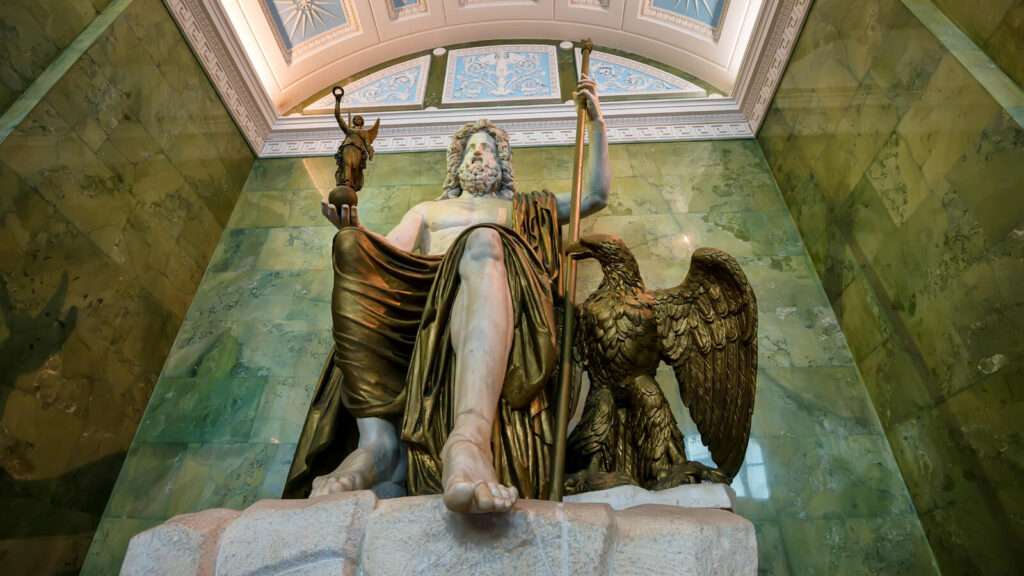
Historical References and Archaeological Evidence
Prominent ancient texts, such as Hesiod’s Theogony and Homer’s Iliad and Odyssey, provide invaluable insights into Zeus’s character, his relationships with other gods, and his interactions with mortals. In these texts, he’s depicted as both a just ruler and a force to be reckoned with. Alongside literary references, archaeological evidence further cements Zeus’s significance in ancient Greek society. Temples dedicated to him, like the monumental Temple of Zeus at Olympia, stand as architectural marvels and bear testament to his worship and the central role he played in religious ceremonies. Altars, coins, and sculptures excavated from various parts of Greece and its colonies frequently feature Zeus, showcasing his widespread veneration.
Delving into the historical context of Zeus not only provides a window into the religious and philosophical outlook of ancient Greeks but also underscores the evolution of societal values over time. As with many myths, the tales of Zeus served as both entertainment and moral guidance, reflecting the hopes, fears, and aspirations of the people who revered him.
The Birth and Rise of Zeus
The ascendancy of Zeus to the pinnacle of Greek mythology is an epic tale laden with intrigue, revolt, and the age-old theme of the transition of power. At its heart, it is a story that encapsulates the cyclical nature of time, where the new order replaces the old.
The Tale of Cronus and Rhea:
In the swirling chaos that predated the world as we know it, the Titans ruled, with Cronus at their helm. Cronus, having overthrown his father Uranus, was warned of a prophecy where he’d be dethroned by his own offspring. In his paranoia, each time his wife Rhea bore a child, he would swallow them whole to prevent the prophecy from materializing. Rhea, distraught by the loss of her children, devised a plan when she was pregnant with Zeus. Instead of presenting the infant Zeus to Cronus, she gave him a stone wrapped in swaddling clothes, which he swallowed, thinking it was his child. The baby Zeus was spirited away and hidden in a cave on the island of Crete, where he was raised in secret, far from the prying eyes of his father.
Zeus’s Rebellion and the Overthrow of the Titans:
Growing up, Zeus was nurtured by nymphs and fed by the divine goat Amalthea. As he came of age, he became aware of his lineage and the fate of his siblings. Enraged by Cronus’s actions and fueled by destiny, Zeus sought allies among Titans, nymphs, and other divine entities. With their aid, he managed to force Cronus to regurgitate his siblings: Poseidon, Hestia, Hera, Demeter, and Hades. This ignited the epic battle known as the Titanomachy, a ten-year-long war between the Titans and the younger gods, led by Zeus. Using his cunning, newfound allies like the Cyclopes, and the power of his signature weapon, the lightning bolt, Zeus emerged victorious.
Ascension to the Throne of Olympus:
After the tumultuous defeat of the Titans, a new era began with the Olympians. Zeus, along with his brothers Poseidon and Hades, drew lots to divide the realms. Zeus received the sky and became the supreme ruler of the gods, residing on the majestic Mount Olympus. From here, he would oversee not just the affairs of the gods but also of mortals, establishing a code of governance, justice, and maintaining balance in the cosmos.
Zeus’s Attributes and Symbolism
Zeus, as the paramount deity in Greek mythology, is an intricate figure layered with diverse attributes and symbolisms. These aspects are not just emblematic adornments; they encapsulate the essence of his dominion, values, and the vast scope of his influence over both the divine and mortal realms.
Emblematic Symbols of Zeus:
- The Lightning Bolt: Perhaps the most iconic symbol associated with Zeus is the lightning bolt. This formidable emblem signifies power, authority, and divine wrath. As the sky god, Zeus wielded lightning bolts as weapons, using them to mete out punishment and assert his dominance.
- The Eagle: Regal and soaring high above the world, the eagle represents Zeus’s vigilance and supremacy. As a symbol, the eagle underscores Zeus’s role as the guardian of both gods and men, watching over the world’s affairs with a sharp, discerning eye.
- The Oak Tree: Rooted deeply in the earth and reaching for the heavens, the oak tree symbolizes strength, endurance, and resilience. For Zeus, the oak, especially prominent in his sacred grove at Dodona, was a conduit for prophecies and a testament to his enduring presence.
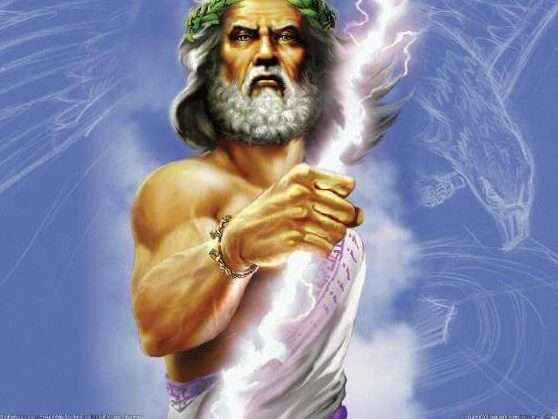
Unique Abilities and Powers:
Zeus’s prowess extends beyond mere symbols. His abilities set him apart, even in the pantheon of gods. As the god of the sky, he had control over the weather, orchestrating storms, rain, and thunder at will. Moreover, he had the unique power to shape-shift, taking on various forms, both animal and human, to interact with mortals. His voice, personified as thunder, could either be a gentle rumble or a fearsome roar, reflecting his varying moods.
Upholder of Order and Justice:
Zeus wasn’t just a formidable power; he was also the embodiment of justice and order. As the ruler of Mount Olympus, he played the role of a mediator, resolving disputes among gods and ensuring that justice prevailed. For mortals, his significance was even more profound. He protected the sanctity of oaths, hospitality, and the inherent rights and laws of men. Those who upheld these virtues found favor in his eyes, while wrongdoers often faced his wrath. His reign, both feared and revered, stood as a cornerstone for moral behavior and societal values in ancient Greece.
Notable Myths Involving Zeus
Zeus’s stories are woven into countless tales that form the bedrock of Greek mythology. While he is the supreme ruler, his tales often display a multifaceted character, marked by passions, decisions, and interactions that have shaped the very world of gods and mortals.
Amorous Pursuits and Their Ramifications:
- Europa: One of the most enchanting tales of Zeus’s love affairs is with Europa, a Phoenician princess. Disguised as a magnificent white bull, Zeus enchanted Europa, who climbed onto his back. He then swam across the sea to Crete, where he revealed his true form. From their union came Minos, the future king of Crete, and the lineage that played a significant role in Greek myths.
- Leda: In another emblematic myth, Zeus took the form of a swan and seduced Leda, the queen of Sparta. From this encounter, Leda laid two eggs. From one, emerged the infamous Helen of Troy and Polydeuces, and from the other, Clytemnestra and Castor. Helen’s beauty and the events that ensued became catalysts for the Trojan War.
- Io: The tale of Io, a priestess of Hera, is tinged with tragedy. Zeus’s affection for her incurred Hera’s jealousy. To protect Io, Zeus transformed her into a white heifer. However, Hera was not easily deceived and set a watchful, many-eyed guard named Argus to watch over Io. Eventually, Zeus sent Hermes to rescue Io by lulling Argus to sleep and ending his watch. This tale exemplifies the complexities and intrigues of divine relationships.
Interactions with Legendary Heroes:
- Aiding Hercules: Hercules, one of Zeus’s mortal sons, was often aided by his divine father. Whether it was guiding him through his Twelve Labors or assisting him during various challenges, Zeus’s influence in Hercules’s myth showcases the divine intervention in a hero’s journey.
- Punishing Prometheus: In a tale that underscores the price of defying gods, Prometheus, who stole fire from the heavens to give to humanity, faced Zeus’s wrath. As punishment, Zeus had him chained to a rock, where an eagle would devour his liver daily, only for it to regenerate and be eaten again the next day.
Zeus’s Hand in the Trojan War:
Beyond personal tales, Zeus’s influence permeated larger epic events. The Trojan War, one of the most defining sagas of Greek mythology, saw Zeus playing a crucial role. While he tried to remain neutral, his decisions, direct interventions, and the actions driven by his relationships with other gods and mortals heavily influenced the war’s course and outcome.
The Influence of Zeus in Art and Culture
Over the millennia, Zeus’s formidable presence hasn’t been confined to just the pages of ancient texts. His likeness, tales, and symbolism have transcended into various forms of art, leaving an indelible mark on both ancient and contemporary cultures.
Zeus in Ancient Artistry:
- Sculptures: Among the most iconic renditions of Zeus is the statue of Zeus at Olympia, created by the sculptor Phidias. Recognized as one of the Seven Wonders of the Ancient World, this chryselephantine statue depicted Zeus seated on a grand throne, holding a scepter and a statue of Nike, the goddess of victory. While the original no longer survives, its descriptions have influenced countless other depictions.
- Paintings: Ancient vases and frescoes often showcased Zeus in various roles – whether as the omnipotent ruler of the skies, in moments of passionate pursuits, or in his interactions with other deities and mortals. These paintings, apart from being artistic endeavors, also served as visual narratives, encapsulating tales for posterity.
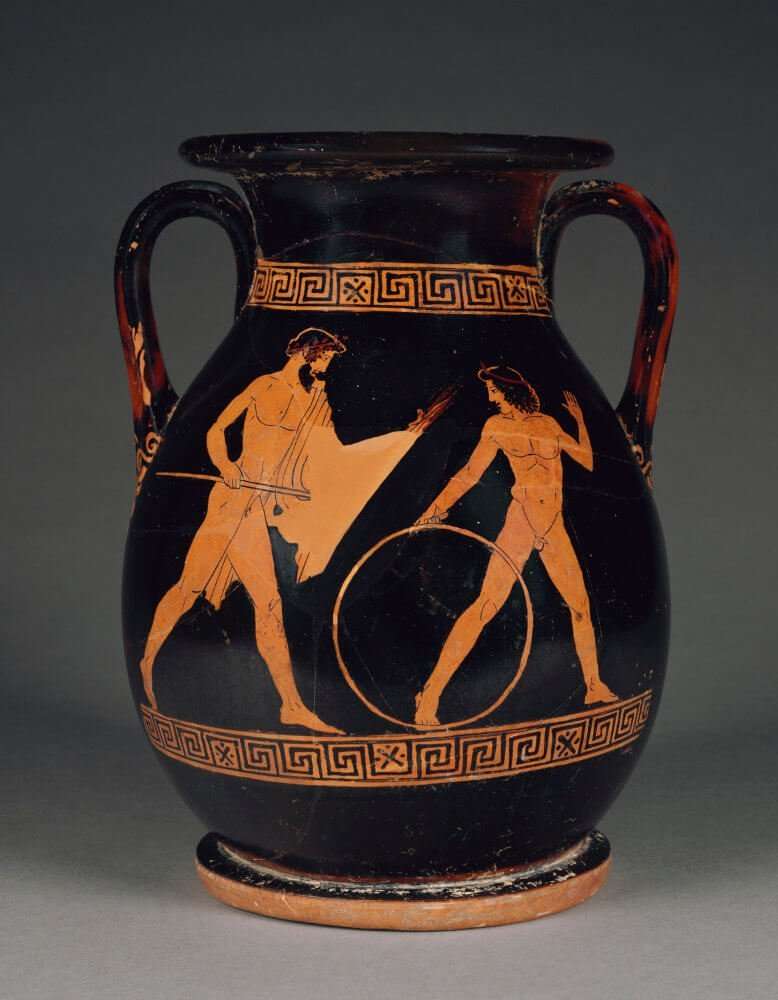
- Coins: The influence of Zeus even permeated the economic landscape. Various city-states and regions minted coins bearing the image of Zeus, showcasing his universal appeal and the reverence he commanded across different territories.
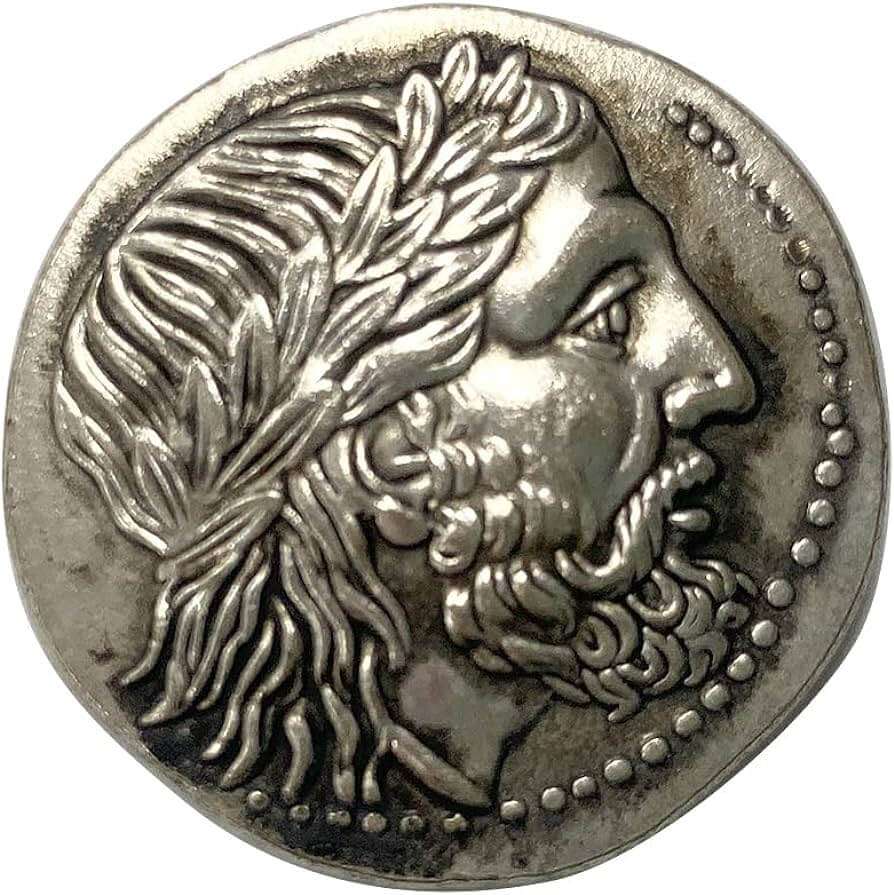
Zeus in Contemporary Culture:
- Movies: Modern cinema has seen the resurrection of Zeus in myriad forms. From blockbuster movies like “Clash of the Titans” and “Percy Jackson & the Olympians” to animated interpretations in Disney’s “Hercules,” Zeus’s character has been adapted, reimagined, and presented for contemporary audiences.
- Literature: The tales of Zeus continue to inspire writers. Whether it’s retellings of ancient myths, novels that weave him into modern narratives, or scholarly works that analyze his myths, Zeus remains a compelling figure in the literary world.
- Popular Culture: The name “Zeus” has become synonymous with power and authority. It’s not uncommon to find references in music lyrics, brand names, or even in everyday vernacular. Phrases like “By Zeus!” or “Zeus’s Beard!” may have their roots in ancient times, but their essence continues to resonate, underlining the god’s enduring legacy.
Comparative Analysis: Zeus and Other Supreme Deities
The figure of a supreme deity isn’t exclusive to Greek mythology. Across various cultures and epochs, societies have revered and told tales of their paramount gods. Comparing Zeus with these central figures can shed light on both shared human values and the unique cultural lenses that shape our understanding of divinity.
Zeus and Odin: A Tale of Two Supreme Gods:
- Shared Motifs:
- Position of Power: Both Zeus and Odin hold the highest position in their respective pantheons. Zeus presides over Mount Olympus, while Odin rules from Valhalla in Asgard.
- Seekers of Wisdom: Both gods have shown a deep yearning for knowledge. While Zeus relied on his vast network of informers like the nymphs and the wind deities, Odin went to great lengths, including sacrificing an eye, to drink from Mímir’s well of wisdom.
- War and Governance: As leaders of their divine realms, both Zeus and Odin are associated with war. While Zeus wielded his lightning bolt, Odin had his spear, Gungnir. Both ensured order, dealt with conflicts, and meted out justice in their dominions.
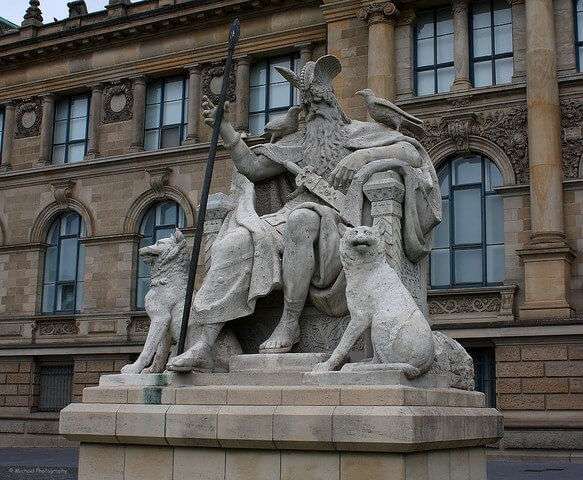
- Distinctive Elements:
- Nature of Worship: Zeus, being in a pantheon of gods that were closer to human frailties, was often approached by mortals with both reverence and trepidation, seeking favors or attempting to appease him. Odin, on the other hand, was revered more for his wisdom and as the god of fallen warriors, with the bravest hoping to join him in Valhalla.
- Relations with Other Deities: Zeus’s relationships with other gods and goddesses were marked by alliances, betrayals, romances, and disputes. Odin’s interactions, especially with other Aesir gods, were more focused on the impending Ragnarok (the end of the world) and preparing for that cataclysmic event.
- Mortal Interactions: Zeus often took a direct interest in mortal affairs, sometimes driven by personal passions or whims. Odin, meanwhile, was more of a distant observer, occasionally sending Valkyries to select the bravest fallen warriors or guiding heroes with cryptic advice.
The Legacy of Zeus in Modern Times
Greek mythology, with Zeus as its linchpin, has persistently infiltrated modern narratives and ideologies. While the direct worship of Zeus may have dwindled with time, the principles, lessons, and tales surrounding him continue to wield an uncanny relevance. Delving into this legacy allows us to unearth the timeless wisdom encapsulated in these ancient tales.
Enduring Influence on Modern Narratives:
- Literature and Film: As previously discussed, Zeus and Greek mythology are regularly reimagined in modern literature and films. These retellings often draw parallels between the age-old tales and contemporary concerns, proving the enduring resonance of these myths.
- Philosophical Undertones: Modern thinkers and philosophers often refer to Greek myths, including Zeus’s stories, to elucidate complex human emotions, desires, and dilemmas. For instance, the tensions and balances Zeus had to maintain offer perspectives on governance, justice, and the challenges of leadership.
- Branding and Symbolism: The figure of Zeus, representing power, wisdom, and authority, finds its way into modern branding, logos, and mascots. Companies and institutions invoke his imagery to symbolize strength, reliability, and leadership.
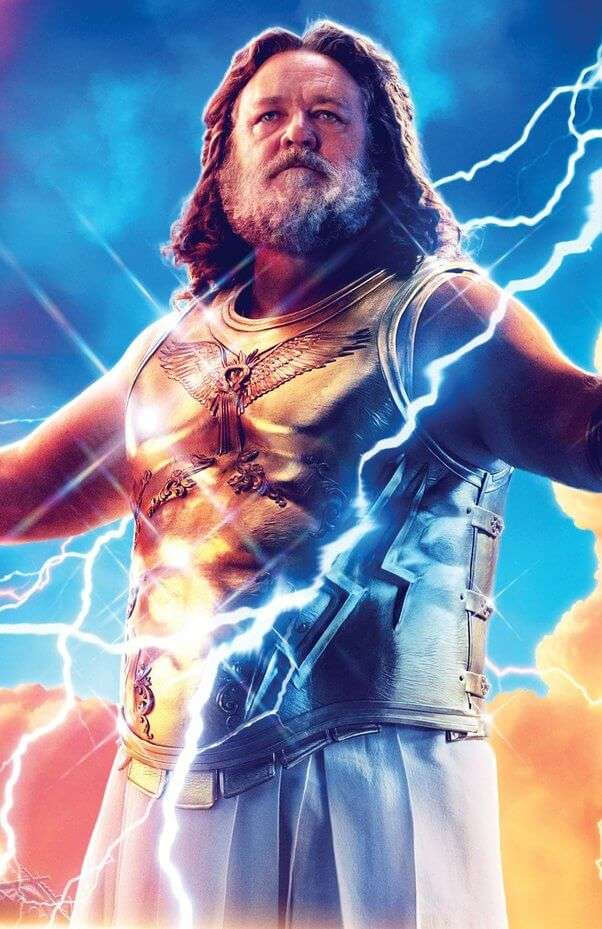
Real-Life Implications and Lessons:
- Understanding Leadership: Zeus’s tales provide profound insights into the nuances of leadership. Balancing fairness with authority, managing dissent, and upholding justice amidst personal biases are challenges leaders face even today. The stories where Zeus excels, or even falters, serve as case studies in governance.
- Power Dynamics: Zeus’s interactions with other gods, goddesses, and mortals offer a rich tapestry of power dynamics. His tales serve as allegories, helping us understand the responsibilities of power, the perils of unchecked authority, and the need for empathy and fairness.
- Human Nature and Morality: Despite being a god, Zeus often grappled with very human emotions—jealousy, love, anger, and pride. His tales shed light on the human psyche’s complexities, urging introspection and an understanding of our inherent flaws and virtues.
- Cultural and Social Impact: The values, norms, and lessons from Zeus’s tales permeate societal constructs even today. Festivals, traditions, and social practices rooted in ancient tales remind us of the intertwined nature of myth and reality.
In Conclusion:
Zeus, though an ancient deity, remains remarkably contemporary in his relevance. His tales are not mere stories of divine exploits but a mirror reflecting human nature, societal structures, and the timeless challenges of leadership and morality. By revisiting and understanding his legacy, we don’t just pay homage to a bygone era but enrich our comprehension of the present, drawing lessons and insights that remain as pertinent today as they were millennia ago.
Conclusion
Zeus, the formidable ruler of the Greek pantheon, has long ceased to be a mere figure of ancient tales and religious fervor. His legacy, intertwined with the very fabric of Western thought and cultural consciousness, stands as a testament to the timeless nature of his myths and their profound resonance with humanity’s perennial concerns.
The stories of Zeus encompass a vast array of human experiences – love, jealousy, ambition, wrath, and wisdom. While the settings of these narratives belong to a distant past, their essence touches upon universal themes that remain relatable to this day. They serve as a reminder of the complexities of leadership, the nuances of power dynamics, the timeless dance of morality, and the enduring human quest for understanding and meaning.
Beyond the tales themselves, Zeus’s influence permeates modern culture. Whether through literature, cinema, art, or philosophical discourse, echoes of his stories continue to shape and inform contemporary narratives. This enduring relevance speaks volumes about the deep-seated human need for myths – narratives that transcend time, providing both solace and reflection, guiding and mirroring our collective conscience.
In the age of information and rapid technological advancements, one might wonder about the allure of these ancient tales. Yet, it is precisely in these times of change that we find ourselves drawn to the constancy of Zeus’s myths, seeking both wisdom and comfort in their age-old pages. For in Zeus, we don’t just see a god with his divine exploits; we see reflections of our ambitions, our fears, our loves, and our battles. It is this intrinsic connection, this mirror to humanity’s soul, that ensures the tales of Zeus will remain etched in our collective memory, guiding, inspiring, and enchanting generations yet to come.
